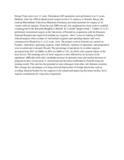| dc.description.abstract | Design
Time series over 11 years.
Participants
685 operations were performed over 11 years.
Methods
After the 1998 al-Qaeda bomb assault on the U.S. embassy in Nairobi, Kenya, the Ludwig-Maximilians-University München (Germany) provided materials for surgery of 42 victims with eye injuries. From the year 2000 onward, this equipment has been used to establish a training unit at the Kenyatta Hospital in Nairobi. In 1 annual “project week,” 1 author (C-L.S.) performed vitreoretinal surgery at the University of Nairobi in cooperation with the Kenyatta National Hospital and supervised resident eye surgeons. After 7 years of training in Nairobi, clinical/surgical observerships of vitreoretinal surgeons and operating theatre staff were commenced in Munich by 4- to 12-week visits. The project week in Nairobi was carried on. Number, indications, operating surgeons, kind, difficulty, duration of operations, and preparation were recorded and evaluated.
Results
The percentage of operations by resident surgeons increased from 29% (in 2000) via 80% (in 2009) to 73% (in 2010) with a partial failure of the laser device. The learning curve of local surgeons is also reflected by an increase of the operations’ difficulty with only a moderate increase in operation time and marked decrease of preparation time.
Conclusions
A vitreoretinal unit has been established in Nairobi using our training model. This unit has the potential to train colleagues from other sub-Saharan countries. This strategy has advantages over long-term aid deployment of foreign physicians such as avoiding financial burden for the surgeons to be trained and improving the home facility, but it requires commitment for long-term cooperation. | en_US |

